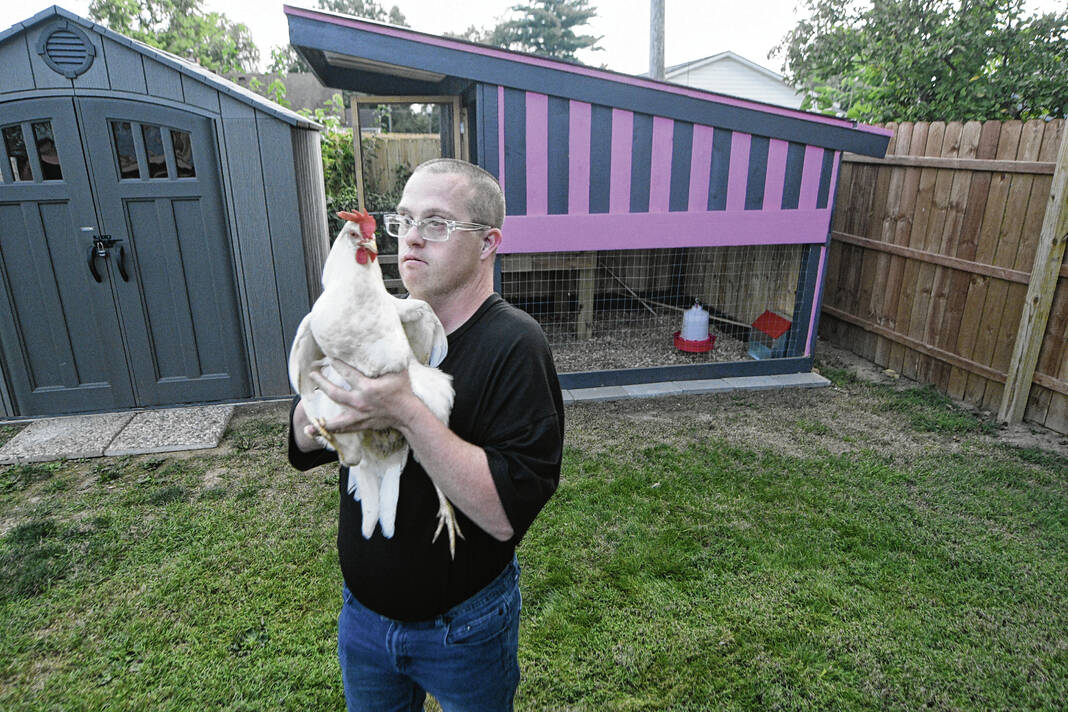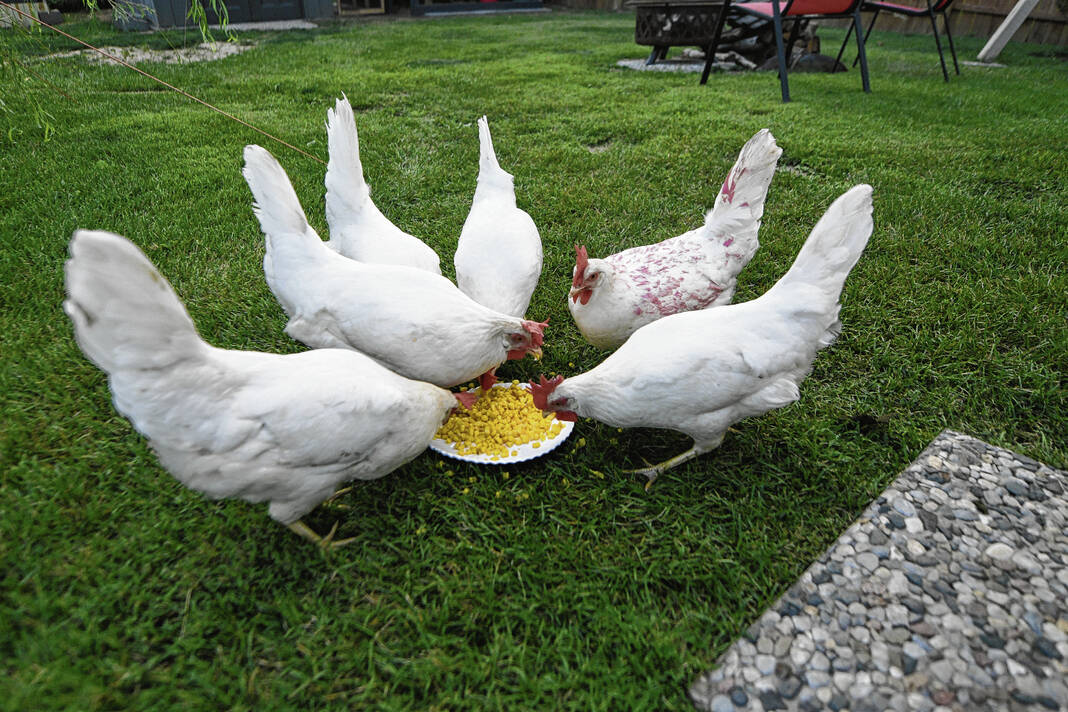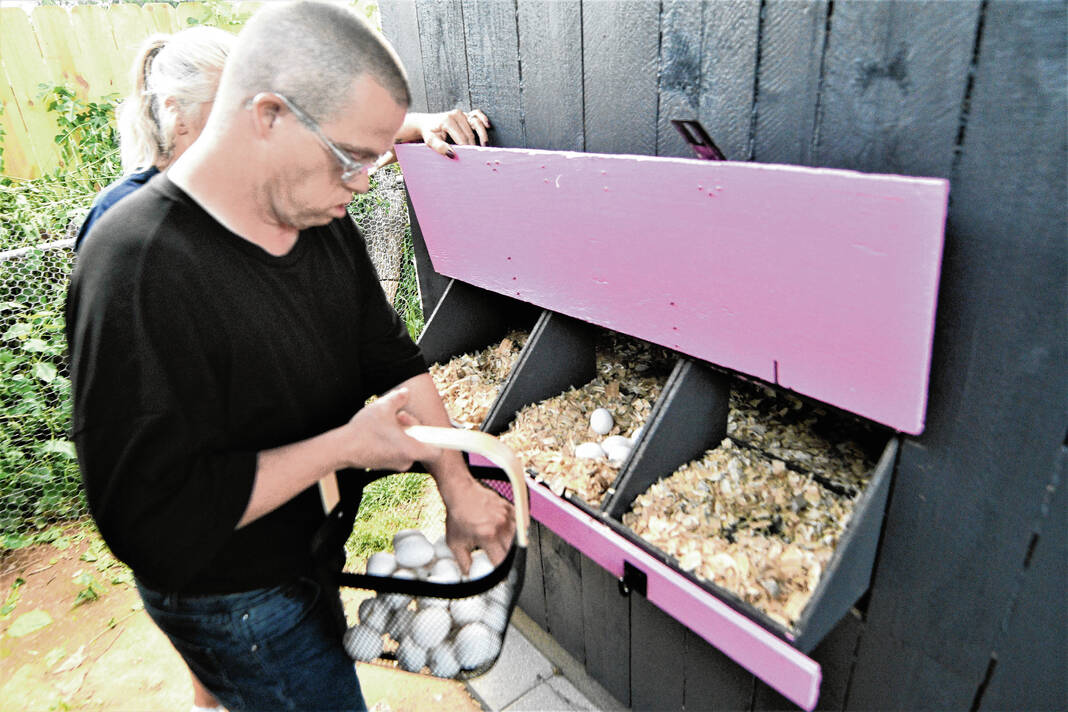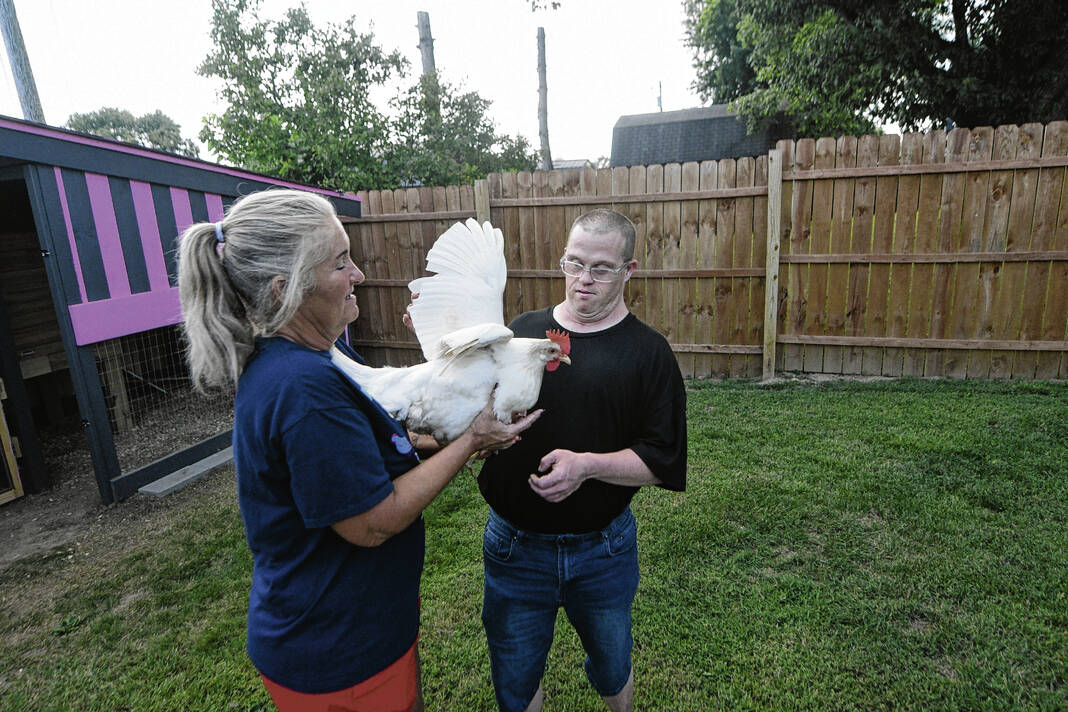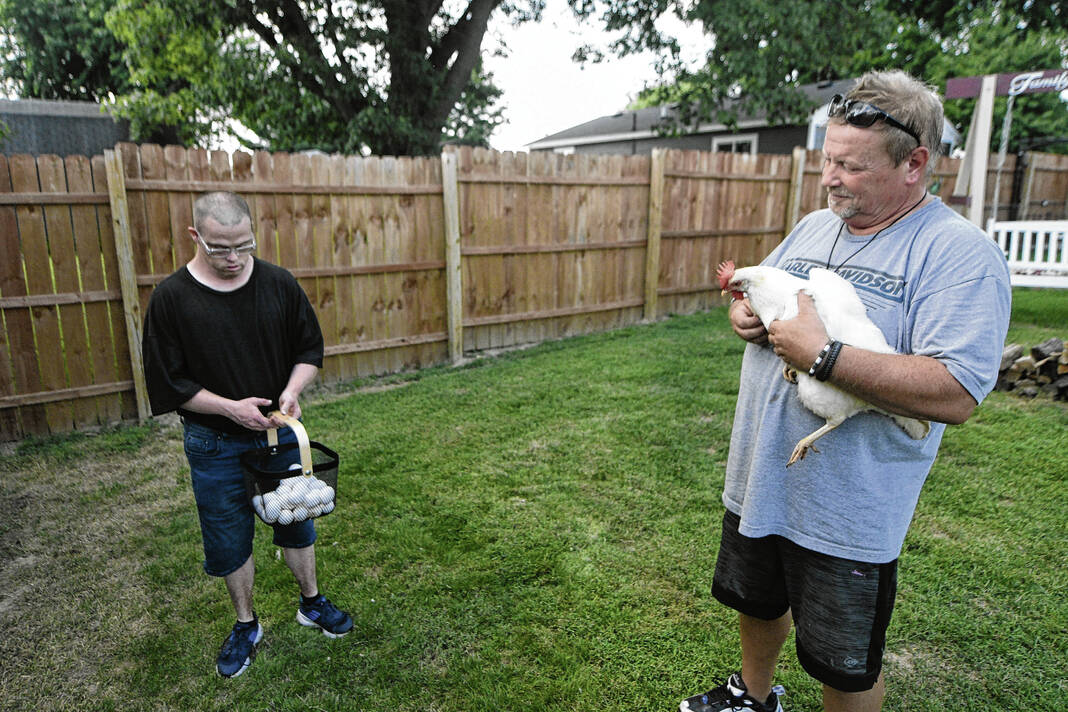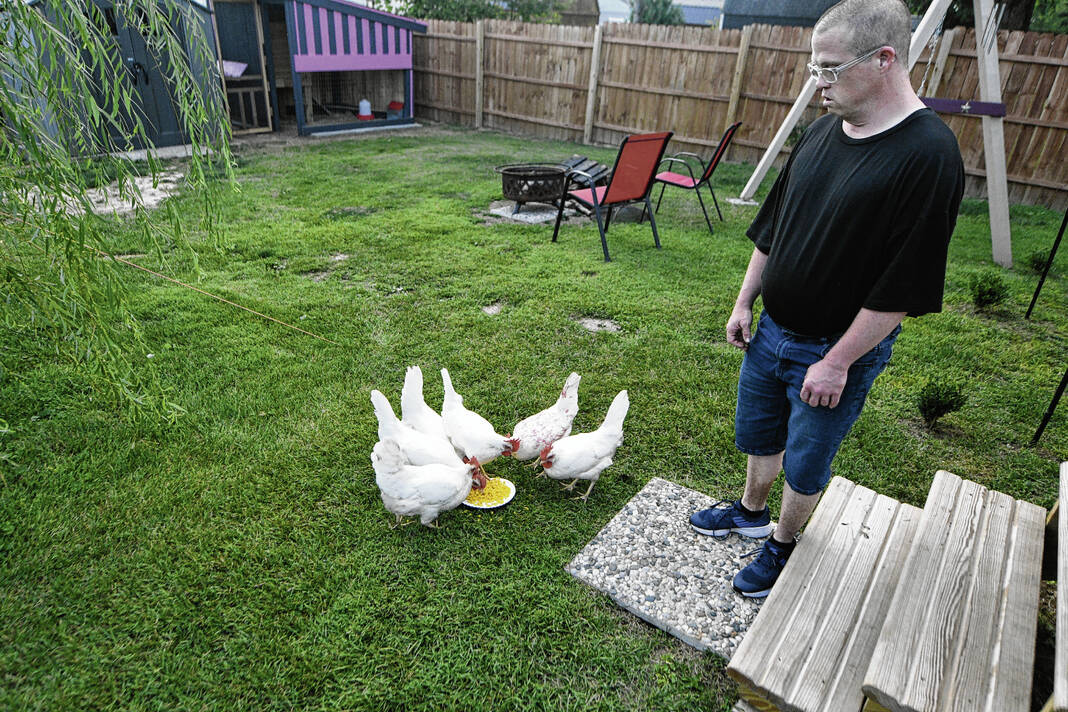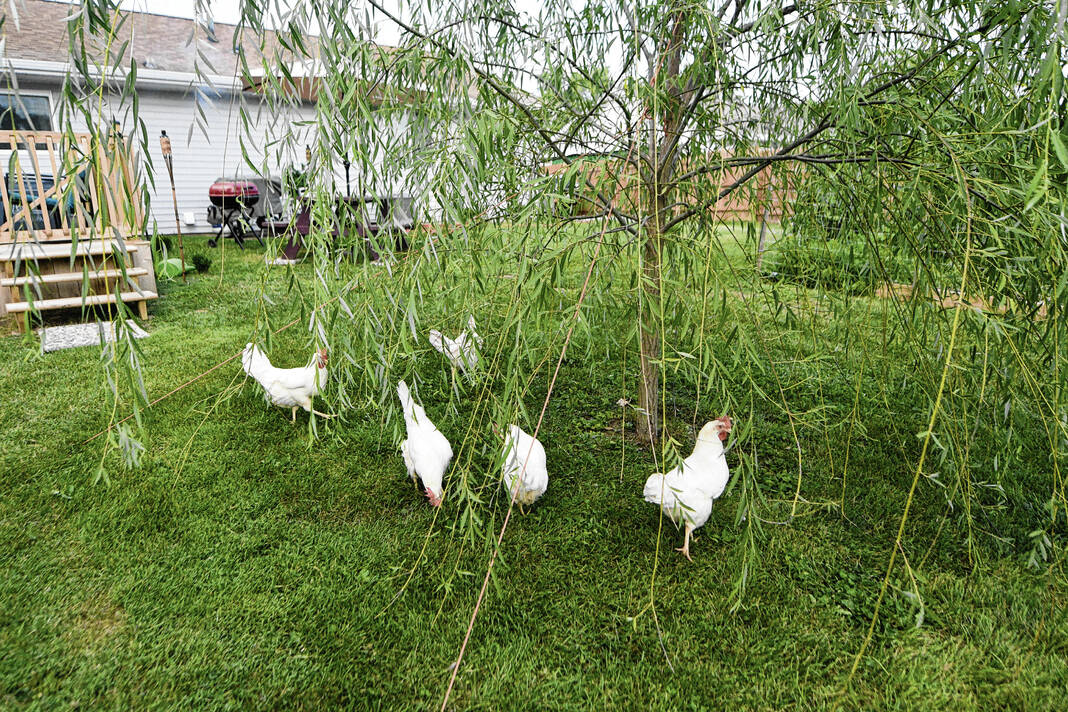Emotional support chickens were on the agenda at Monday’s Edinburgh Town Council meeting.
Annette and David Young brought the ordinance to the council’s attention after they received a notice they were going to receive fines for keeping backyard chickens. The Youngs, who are caregivers for Jason Grabarczyk, an adult who lives with Down’s Syndrome, say they need to be able to keep chickens because they are therapeutic for Grabarczyk.
Edinburgh Town Council members voted unanimously to uphold an ordinance banning chickens within town limits during their meeting on Monday, but Town Manager Kevin McGinnis said the town will try to come up with a solution for Grabarczyk.
About Grabarczyk
Grabarczyk has spent his life living with Down’s Syndrome, which has caused numerous other health issues, said Annette Young, who has been one of his caregivers for 27 years.
“He has dementia and early-onset Alzheimer’s. He has moderate (mitral regurgitation), pulmonary embolism, heart failure, PTSD, anxiety, depression, blood clot disorder and a high risk for choking and falling,” she said. “He had a blood clot in 2010 and he was on life support for two months. They called the whole family in and he had a (tracheostomy) and feeding tube. He called himself a Christmas miracle.”
She met Grabarczyk when he was a young adult living in a group home, where he stayed after his biological father emancipated him. One day, after Young left her job, Grabarczyk called her.
“He called me one day and said ‘can I live with you? I miss you,’” she said. “I got him and he’s been with me ever since.”
Annette Young cared for Grabarczyk with David Young, her husband at the time. Brad Rooks and Abbie Dowell also came on board as advocates.
“We basically speak for Jason in order to maintain his rights, that’s what advocacy is,” Dowell said. “We’re also his caregivers. We make sure he’s doing hygiene, nutrition, medication, education and exercise.”
Why chickens?
Grabarczyk is allergic to cats and dogs, and the Youngs wanted to make sure he still could have an emotional support animal. In March, Grabarczyk came up with the idea to get chickens.
“We were in Rural King and he said ‘can we get some chickens?’” she said. “I didn’t know there was an ordinance. I would never break the law on purpose.”
The town code section 91.02 pertaining to keeping poultry and pigeons went into effect in 2015. It says “It is a nuisance and shall be unlawful for any person to keep poultry or pigeons, or to maintain any place where poultry or pigeons are kept.”
Annette Young advocated for the council to change the ordinance because residents should be allowed to keep them. The Young household also isn’t the only one in town that keeps chickens, she said.
“It’s not just dogs that are therapeutic, it can be horses, cats, llamas, pigs. This ordinance is from 2015, it’s outdated,” she said. “I asked the town specifically to change it to six chickens, no roosters, because that is a nuisance. They’re mean and loud and they ‘cock-a-doodle-doo’ all day long. There’s lots of people in town who have chickens and roosters and they have babies. We don’t want babies.”
The chickens help ease Grabarczyk’s PTSD and they give him a reason to be outside the house, David Young said.
They also make him happy, Dowell said.
“The only thing that makes him smile is a chicken and a cold (beer),” she said.
The case for chickens improving his life is also backed up by doctors.
“He has a family of chickens that serve as emotional support animals for him,” one doctor’s letter says. “The presence of these emotional support animals help mitigate his emotional issues and also help teach him some responsibility and independence. They are therefore therapeutic and I recommend he continue to care for them as they benefit his disability.”
Notice from the town
Annette Young said she didn’t have any reason to be worried about having the chickens, which were fenced in and are housed in two sheds, until July. It was then that one of the chickens jumped over a fence into a neighbor’s property. The next day a town building and zoning official, handed them a notice telling them they couldn’t have their chickens, Young said.
If they kept them, they’d have to pay a series of escalating fines: $100 for the first offense, $250 for the second offense and $500 for each offense thereafter, according to Ordinance 2015-4.
Overton directed them to the Edinburgh Board of Zoning Appeals, but town attorney Dustin Huddleston said that direction was incorrect, and the decision was in the hands of the town council.
“They filed for the BZA and when it was sent to me, I looked it up and BZA had no authority to grant a variance,” Huddleston said. “They had to ask the council for amendments to ordinances.”
The fines and requirements to get rid of the chickens were put on hold while the council deliberated. They first had a meeting Aug. 14, hearing the case of Grabarczyk’s family, but because the full council wasn’t present, members decided to postpone making a decision until this week. On Monday, they voted unanimously to uphold the ordinance outlawing chickens.
McGinnis said a total of four households have been notified they’re in violation of the ordinance. While fines were put on hold until the council’s decision, it is unclear how long families will have to pay off the fines now that the ordinance has been upheld.
Council decision
During the meeting Ryan Piercefield, the town council president, proposed a permit system to allow some residents to own chickens, however, he and other council members ultimately decided against that on Monday.
Piercefield was the only council member who commented on the matter during the meeting.
“While you guys may be fantastic at taking care of chickens, the next five people may not be,” he said to the Grabarczyk family.
The council also had to consider the possible consequences and conflicts between neighbors that may arise from allowing chickens, he said.
With the decision, the family will consult a disability rights organization about their next steps. They will also consult them about possible legal action if that organization deems it necessary.
McGinnis, however, said he will try to make sure the town is able to come up with a solution for the family. That may include postponing fines and actions to remove the chickens.
“We’ll try and be reasonable. They can reach back out and we’ll sit down and have a meeting to come up with an agreement and be reasonable with them,” McGinnis said. “This is a big shock to them. Since it was so screwed up in the beginning with what they were told, we may waive the fines. I’m going to wait to see if they reach out to me to come up with a proposal. There’s no time limit to get rid of (the chickens).”


